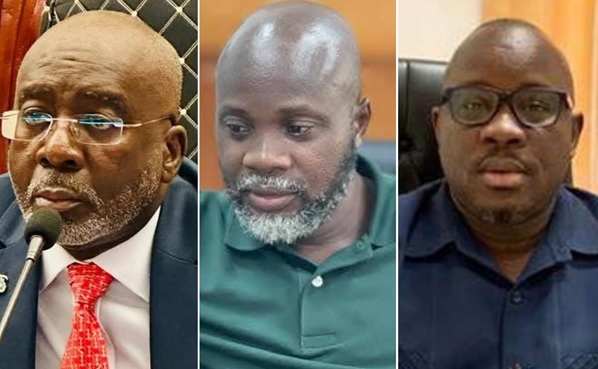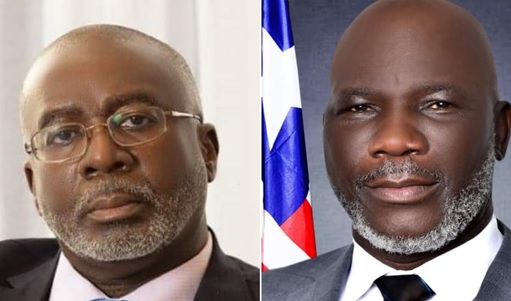MONROVIA – Liberia’s political scene continues to struggle with deep-rooted issues of corruption, particularly within its legislative body. Recent reports and investigations have brought to light widespread allegations of misuse of public funds through a controversial supplementary payroll system, which is supposed to support legitimate legislative operations. Instead, it appears that several prominent figures within the House of Representatives (HoR) have exploited the system for political gain, raising serious concerns about the integrity of the country’s governance structures.
One of the key figures at the center of this scandal is Bong County Representative Marvin Cole. Cole, a former co-chair of the Rules, Order, and Administration Committee, has come under fire for allegedly using his position to enrich political allies and personal associates. Investigative journalist James Samuel Goodday Flomo has exposed names tied to the supplementary payroll, including individuals from Cole’s private institutions. According to Flomo, these people had no legitimate ties to legislative functions but were still receiving payments, prompting widespread outrage among the public.
The controversy deepened with the involvement of HoR Deputy Controller Hilary Sackie, who was accused of placing players and officials from Paynesville FC on the supplementary payroll. This development added to the mounting public criticism and further tarnished the reputation of the legislature. However, it was not just Cole and Sackie who were implicated in these questionable practices. Speaker J. Fonati Koffa, who has faced growing calls for resignation, is also accused of placing journalists and loyal supporters on the payroll to secure positive media coverage and bolster public support. Critics argue that these individuals have become vocal defenders of Koffa’s leadership, using their influence to undermine efforts to remove him from office.
Koffa’s refusal to step down, despite being ousted by the House Majority Bloc, has intensified the debate. The newly elected Speaker, Richard N. Koon, replaced Koffa, but the former Speaker has dismissed calls for his resignation, labeling them as unconstitutional. Koffa claims that his colleagues did not follow proper procedures in attempting to remove him. His stance has raised concerns about the political dynamics within the HoR and whether his defiance is more about self-preservation than the legality of his position.
The political fallout from this scandal extends beyond Koffa’s leadership. It has sparked a national conversation about the culture of corruption in public institutions. Questions are being raised about the ethical standards of elected officials and whether they are serving the public interest or merely using their positions to further their personal and political agendas. The actions of Cole, Sackie, and Koffa suggest that the latter may be true, perpetuating a culture of self-interest that erodes public trust and hampers national development.
The financial cost of this corruption is significant. Resources that could have been used to address Liberia’s pressing issues in sectors such as education, healthcare, and infrastructure are instead being siphoned off to sustain a bloated and unaccountable payroll. This misuse of public funds exacerbates the nation’s poverty and inequality, creating a vicious cycle where the majority of the population bears the consequences of poor governance while a select few thrive.
Political analysts have suggested that Koffa’s political career could still be salvaged if he were to resign. Gabriel Nah, a prominent political commentator and lawyer, argued that stepping down could allow Koffa to rebuild his reputation away from the cloud of controversy, positioning him for future elections. However, the larger issue of the supplementary payroll remains unresolved. How did a system designed to support the legitimate needs of the legislature become a tool for patronage and political favoritism? The failure to address this issue could have lasting implications for Liberia’s democratic institutions.
The role of the media in uncovering this scandal cannot be overstated. Journalists like Flomo, despite being outside Liberia for safety reasons, continue to expose corruption and demand accountability from public officials. Their work has been vital in shedding light on the misuse of public funds and calling for transparency. However, the allegations that some journalists have been complicit in these corrupt practices by accepting money from the supplementary payroll raise troubling questions about media integrity. For Liberia’s press to maintain its watchdog role, it must remain independent and free from political manipulation.
Public pressure has also played a crucial role in pushing for accountability. Liberians must demand transparency from their leaders and reject corruption as an unavoidable part of governance. Civil society organizations and advocacy groups must continue to amplify their voices, calling for reforms that prioritize the country’s long-term well-being over short-term political gain.
The resolution of the current scandal will require comprehensive reforms within Liberia’s governance structures. Independent audits of legislative operations, stricter oversight measures, and stronger conflict-of-interest policies are essential to prevent future abuses. Without these changes, the cycle of corruption will continue to undermine the country’s progress, hindering its ability to provide essential services and improve the lives of its citizens.
Liberia is at a crossroads. The actions of lawmakers such as Cole, Sackie, and Koffa have exposed serious flaws in the political system, but this crisis also offers an opportunity for change. The country has a chance to address corruption head-on and implement the necessary reforms to create a more transparent and accountable government. However, this will only be possible if its leaders are willing to put the needs of the people above their own personal interests.
In response to the growing controversy, the House of Representatives has initiated a comprehensive review of its supplementary payroll system. As part of this process, several individuals with questionable employment statuses have been removed. Among them is Isaac Garyeazon Redd Sr., the former Deputy Director of the Liberia Broadcasting System (LBS), who was listed on the payroll despite lacking a clear legislative role. Others, such as Winston Blyden, an employee of Rep. Abu Kamara’s radio station Bana FM, and Jallah Grayfield, who was affiliated with private entities, have also been removed. These actions signal the beginning of efforts to reform and clean up the system.
However, the question remains whether these actions are sufficient to address the root causes of the issue. The revelation that four journalists working for Cole’s radio station in Bong County were placed on the payroll is just one example of how the system was manipulated for personal and political gain. The inclusion of individuals like Emory T. Saylae and Mark Nimene, who were associated with Cole’s political activities, adds further weight to allegations of widespread abuse.
Flomo’s investigation, which uncovered over 50 individuals with no known legislative role on the payroll, paints a troubling picture of the extent of the corruption. His description of “double-dipping,” where individuals were listed on both the supplementary payroll and the Civil Service Agency payroll, highlights the depth of the problem.
Cole, despite the mounting allegations, has defended his actions, arguing that his critics are politically motivated. His alleged threats to use force in defense of former Speaker Koffa only serve to deepen the divisions within the legislature. Meanwhile, the House leadership has called for greater transparency and has requested Koffa to submit the names of staff members from his tenure for salary processing. Koffa, however, has refused, further complicating the situation.
As the investigations continue, the calls for reform grow louder. The scandal has exposed a systemic issue within Liberia’s legislature, where personal and political loyalties often take precedence over the public good. Without significant reforms, Liberia’s governance structures will remain vulnerable to exploitation, undermining the nation’s prospects for progress and development.
The road to recovery is long, but it is not without hope. By confronting corruption head-on and pushing for accountability, Liberia can begin to rebuild its trust in government institutions. The question remains: will its leaders rise to the challenge, or will they continue to perpetuate the system of corruption that has kept the country from realizing its full potential?







